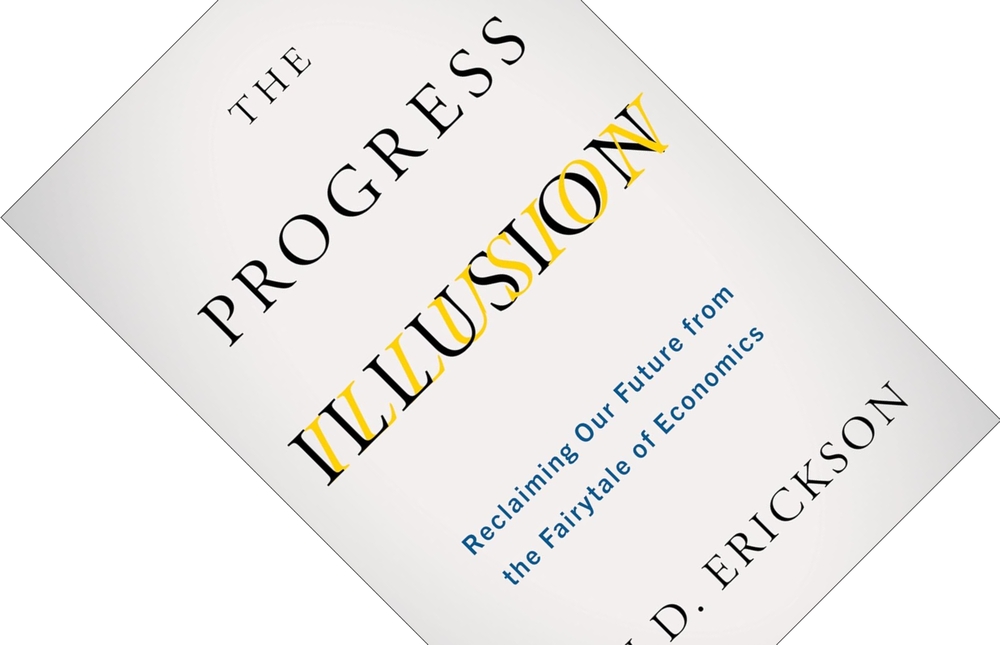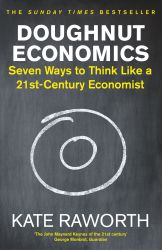9-minute read
keywords: economics
Do you know what warms the cockles of my heart? A neoclassically trained economist turning on his own education and discipline. That describes the career trajectory of economist Jon D. Erickson. The Progress Illusion is part history lesson of how neoliberal economics ended up on top, part manifesto for a different economy. For Erickson, the answers lie in the emerging discipline of ecological economics. Though there is much to like here, I did notice some curious omissions.

The Progress Illusion: Reclaiming Our Future from the Fairytale of Economics, written by Jon D. Erickson, published by Island Press in December 2022 (paperback, 251 pages)
Part of what makes The Progress Illusion an accessible and enjoyable book is that Erickson injects his personal story into it. Like so many young men in the 1980s, he had a singular goal: “Study economics, major in business, and make lots of money” (p. 1). Why the change of heart? The first chapter charts how several teachers made him question how economics was getting away with e.g. not including externalities such as pollution in the cost of products and services. Reading The Limits to Growth and the Brundtland report that coined the term sustainable development brought that identity crisis to a head: “Shit, now what? I could feel my teenage dreams of a career in high finance slip away” (p. 16). It was when he encountered Herman Daly’s writing on steady-state economics that he converted to ecological economics. As I am not intimately familiar with this discipline and, as explained here, it is very different from the similar-sounding environmental economics, very briefly: What is ecological economics? It explicitly acknowledges that our economy is part of, and dependent on, our planet’s ecosystem. For Daly, one consequence of this was that “infinite economic growth on a finite planet was both physically impossible and morally wrong” (p. 113). Erickson, in turn, is no less outspoken: “I’m convinced that economics as currently taught and practiced throughout the world is a planetary path to ruin” (p. 25).
The impossibility of infinite growth on a finite planet? I am on board with that. So how did we get to the point that mainstream economics blithely ignores this? The next three chapters, roughly the first half of the book, chart the history of neoclassical economics. Whereas classical economists (Malthus and John Stuart Mill are mentioned) never fully abandoned the notion of moral constraints and social obligations, neoclassical economics did, clothing itself in the objective language of mathematics. Greed became good. A very brief rundown of some of the key players and events goes something like this…
Erickson mentions amongst others Léon Walras (whose general equilibrium theory is the basis of the assumption that free market mechanics will naturally result in a state of balance), Henry George (whose work boosted the late-19th century progressive movement), World War I (which put a damper on said progressive movement), President Warren G. Harding (who set in motion unprecedented deregulation and inequality), Arthur C. Pigou (who pointed out that market equilibrium is not necessarily equal to a social optimum and championed externalities and wealth redistribution), John Maynard Keynes (who strongly argued for government intervention), the 1930s Great Depression (an all-round kick in the teeth), President Roosevelt’s New Deal (which favoured government intervention), Simon Kuznets (who developed economic metrics to measure national income), World War II (which was followed by a pivot of the economy from wartime production to peacetime consumption), the 1944 Bretton Woods Conference (which created the World Bank and saw 44 Allied nations peg their currencies to the US dollar), Paul Samuelson (who after Keynes’s death selectively appropriated some of his ideas into the neoclassical orthodoxy), the presidencies of Richard Nixon and Ronald Reagan (who pushed neoliberalism, the fusion of libertarian politics with free market economics, which reduces all social relations to market logic, i.e. exercising democratic choices with our wallets), and finally the abovementioned rise of ecological economics (some key figures are Herman Daly, Nicholas Georgescu-Roegen, and Bob Costanza).
“The impossibility of infinite growth on a finite planet? I am on board with that. So how did we get to the point that mainstream economics blithely ignores this?”
Taking a step back from this flurry of names and events showed me three things. First, if, like me, you have no formal background in economics, these three chapters provide useful context to famous names you will have no doubt heard at some point. Second, this history is US-centric but for once it is actually appropriate. The USA has an outsized influence on the global economy, institutes such as the IMF and the World Bank are headquartered in Washington, DC, and the US dollar has become the de facto global currency. Third, the big picture is that neoclassical economics ultimately triumphed, despite renegade economists repeatedly speaking out against it and despite repeated swings towards more progressive governance. How? Some important contributing factors are that it was drawn up by privileged men, “a wealthy elite has always liked this model—a lot” (p. 38), and more recently well-funded conservative and business-friendly think tanks have persistently lobbied in its favour. With it have come all the harms that are blindingly obvious to many: hyper-individualism, obscene wealth inequalities, business interests exercising undue influence on politics, natural resource depletion, pollution, etc. etc. Now, given the political nature of this topic I understand that some people will look at the above list and shrug: “it’s a dog-eat-dog world, kiddo, quit your whining”. That is your opinion and you have at it, but a fair and just world it is not.
The next three chapters lay out Erickson’s proposal to, as the book’s subtitle says, reclaim our future. First, we need a new narrative, different from the (ultimately) biblical narrative that encourages us to take ownership of natural resource, go forth, and multiply with abandon. For many, that new narrative is green growth, which he calls out for the farcical solution it is, given that it refuses to break with the core economic logic of perpetual growth. Growth cannot solve the problems created by growth. Second, we thus need a new economics. For this, he leans heavily on E.O. Wilson’s idea of consilience, the notion that knowledge in different disciplines should converge. The problem with neoclassical economics is that it ignores other fields. It pretends that we can separate the economy from material and energy flows, ignoring the natural sciences, and it pretends that we are rational actors who only act out of self-interest, ignoring the social sciences. Erickson’s collaborator Peter Brown has aptly described economics as “an orphan discipline. Its intellectual parents died long ago, yet the untethered child [roams] the halls of academia doing great harm” (p. 191). Third, we need a new economy. Whereas the previous chapters occasionally suffer from generic statements along the lines of “change is necessary”, leaving you with the “how” questions, this chapter gives more pragmatic answers. Examples include tax reform, breaking up monopolies, investing in public goods, employee rather than shareholder-owned companies, and democratic stakeholder projects such as cooperatives. For his part, Erickson focuses on educational reform. Just how necessary this is was highlighted in the article How Higher Education Imperils the Future that he co-authored: “an unspoken truth [is] that while the [natural] sciences [are] meticulously documenting environmental destruction, the social sciences and humanities [are] propping up the very systems of economics, law, governance, and philosophy that promote a planetary suicide pact” (pp. 192–193).
“I was taken with his idea that growth should be seen as the initial stage of a maturing economy, as a temporary phase towards stability, which is a universal characteristic of growth in the natural world.”
I admit that I found little in this book to disagree with. In particular, I was taken with his idea that growth should be seen as the initial stage of a maturing economy, as a temporary phase towards stability, which is a universal characteristic of growth in the natural world. That said, I was surprised by two omissions. Most glaring to me is that, despite referencing work by Jason Hickel and Giorgos Kallis, he studiously avoids any mention of degrowth. Fine, you may disagree with it, but then tell us why! Though I still have to fully engage with degrowth scholarship (I promise I am going to once I manage to pull my head out of all these biology books), I have noticed that many progressively-minded people really dislike the term degrowth as it does not make for a compelling story. This attitude, to me, completely misses the point: there is no sugarcoating the problem that, as Erickson admits himself, “some must do without excess so that others can simply get by” (p. 121). So, degrowth it is. Suck it up. Even degrowth advocates argue it will be a temporary transition to a right-sized, steady-state economy. The other, unfortunately less surprising omission, is the matter of overpopulation. Though Erickson acknowledges that “depletion and pollution have accelerated to meet the demands of more people and more economy” (p. 138), he only touches on economy, while population remains too hot a potato it seems. Since he mentions Kate Raworth’s doughnut economy, which aims for a social floor where we meet the basics for everyone, my question is whether we can do so for eight (soon likely ten) billion people without simultaneously breaching the model’s ecological ceiling. Maybe we can, but this is not something we should blindly assume. To think that we can just bend the growth curve on the current economy to achieve a steady-state plateau and redistribute wealth (which would at least address that problem) ignores the question of whether we are in planetary overshoot full stop. Admittedly, my views on both these matters are radical, and to many no doubt unpalatable.
The history lesson and introduction to ecological economics are easily the book’s strongest suite. Seeing I am already fully on board with Erickson’s ideas (and then some), perhaps I am not its target audience though. Like many books diagnosing social ills, The Progress Illusion suffers somewhat where proposing solutions is concerned. That said, it does better than many others by recognizing that, while we already know what form of economics does not work, figuring out what does will require radical pragmatism: “a willingness to try whatever works, guided by an experimental mindset and commitment to empiricism and measuring results” (pp. 173–174). That call is very welcome indeed.
If you want to know more, the Economics for Rebels podcast published a 40-minute interview with Erickson back in November 2022 that I can thoroughly recommend.
Disclosure: The publisher provided a review copy of this book. The opinion expressed here is my own, however.
Other recommended books mentioned in this review:
__________________________________________________________________
__________________________________________________________________
__________________________________________________________________













wow …. Finally something that articulates everything I think but don’t have the words for. I did not realise I was a radical 🤔 as I believe in very much what you do regarding planetary overshoot. I never understood the concept of unfettered economic growth and the notion that economies need to grow for society to flourish. I studied economics in the nineties for a semester and I just couldn’t get my head around the disregard for consequences and the idea that it was possible to keep growing with finite resources – it was a no-brainer of impossibility to me – so I took a full history load instead. Much more interesting and fun 😉
Thankyou for a great review as always and alerting me to a book I shall be reading.
LikeLiked by 1 person
Thanks Tania, your struggles with economy very much describe Erickson’s experience as a student.
LikeLike
Thanks for making this jump to ecological economics. Indeed it is increasingly obvious that from the market celebration of the past we are approaching an increasing recognition of the fact that the Washington Consensus has brought misery all around – the simple fact of market failures…
At the same time, in accord with such recogition, even from the ranks of the neoclassically-trained economists, in addition to “degrowth”, there should be more attention to previously side-lined heterodox theories such as dependency theory or world-systems theory. What needs to be addressed are also the international financial institutions – that since 1945 have dictated the rules of the current economic system. In particular how a just green transition cannot be achieved withouth placing the Global South at the core of remaking the global financial and economic system that has brought us to where we are.
So we need – in the words of Daniela Gabor and Ndongo Samba Sylla – a new “Bandung Woods” not a new Washington Consensus.
LikeLiked by 1 person